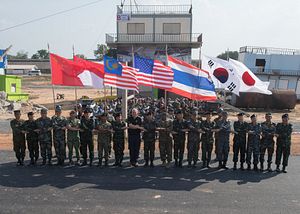Next week, the United States and Thailand will kick off the 2020 iteration of the annual Cobra Gold exercises – an engagement that began as a bilateral drill between the two allies and has now grown into Asia’s largest multinational drill. Though this is only the latest of a longstanding engagement, it will nonetheless be watched closely amid wider developments, whether it be the state of U.S. Southeast Asia policy or the ongoing coronavirus which may affect the shape of participation.
As I have observed before in these pages, the Cobra Gold exercise in recent years has taken place amid broader trends, be it the recalibration of the U.S.-Thailand alliance itself following the chill that occurred after the May 2014 coup, the rollout of the U.S. Indo-Pacific strategy, and the Thai government’s management of an array of foreign policy challenges amid its ongoing domestic political transition.
Next week, the alliance will be in focus with the holding of the 2020 version of the Cobra Gold military exercises. Though aspects of the exercise such as civic assistance projects will be ongoing as well, the military aspects of the 39th iteration of the exercise series which tends to be the focus of the headlines will kick off on February 25.
Per details released at a joint press conference last Friday, the exercise is set to take place from February 25 to March 6, in Phitsanulok, Sukhothai, Rayong and Chon Buri provinces, featuring more than 9000 military personnel from 29 countries.
According to The Bangkok Post, participating nations in the main training exercise this year will include Thailand, the United States, Singapore, Japan, Indonesia, South Korea, and Malaysia; with additional participants in the Multinational Planning Augmentation Team including India and China and observers from various countries such as Laos, Vietnam, Brunei, Myanmar, Pakistan, Cambodia, Israel, Germany, Sweden and Switzerland. U.S. participation is expected to include 5,500 personnel, 64 fighter jets including six F-35 aircraft for the first time, and two naval ships.
Few details have been released thus far about the specific activities at the exercise. But The Bangkok Post noted that there are expected to be some notable aspects this year, including “full scale” cyber warfare training. In addition, in the wake of reports that the level of participation by certain countries may be affected by the coronavirus, Chalermpol Srisawat, the Royal Thai Armed Forces’ chief-of-staff, also said that precautionary measures would be taken to safeguard the health of the soldiers.
To be sure, details have still not been publicly disclosed about aspects of the exercise, and a full assessment of the drills will have to wait until they are carried out. As we see this play out in the coming weeks, one can expect continued scrutiny on its various aspects, from the relative level of U.S. participation to any new engagements or areas that shed light on the state of the alliance and how it can promote wider regional collaboration.

































